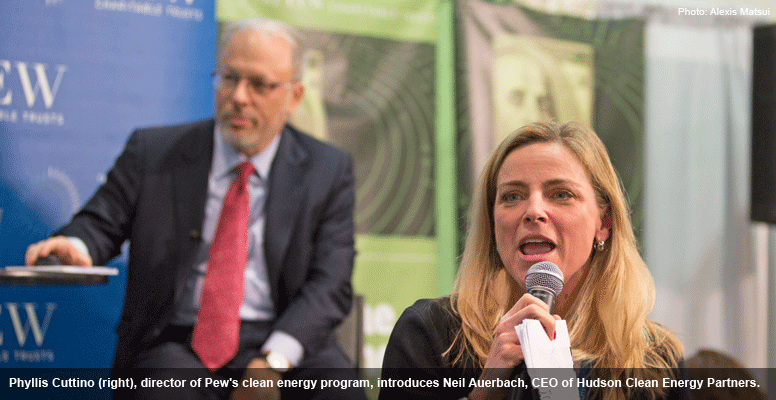Pew Hosts Clean Tech Finance Talks
Experts share tips with innovators
The threat of snow in didn't deter attendees, who packed the ARPA-E annual Energy Innovation Summit on Tuesday, Feb. 26. The forum brought together leading thinkers from the public, private, and nonprofit sectors to explore the importance of innovation in successfully developing and deploying new clean energy technologies.
As part of The Pew Charitable Trusts' ongoing work on clean energy policy, Pew hosted a series of cleantech finance talks allowing entrepreneurs and researchers at the summit to explore the challenge of funding innovation to turn advanced energy ideas into reality. The talks, featuring insights from leading venture capitalists, corporate technology management, and research and innovation experts, were moderated by Phyllis Cuttino, director of Pew's clean energy program.
Neil Auerbach, CEO of Hudson Clean Energy Partners, kicked off the first session with some of his insights as a seasoned, venture capitalist in the clean tech sector. "It all starts with great technology, but it doesn't end there," Auerbach said. "It's all about making money at the end of the day, if you're a 'check writer.' We have to earn a good return on our investments, [and] we have to be able to get into the markets and make a profit."
Nikhil Garag, a vice president with Black Coral Capital, agreed. He also stressed that sound business models are critical in new clean energy ventures, which often are aimed at reinventing how established energy products will be consumed. "All too often I see companies that have very interesting technologies, but not nearly enough attention or planning around the business model side," Garag noted.
Venture capitalists say persistence and leadership are key
To stand out in the crowd Auerbach offered seven tips for companies looking to secure financing for clean energy innovations: (1) Persistence: it takes more than a great idea to make it. (2) Build strong teams: if you don't have a good team, you won't win. (3) Good timing is important: the last couple of years have been difficult, but the tide is turning. (4) Know your market and connect with your customers. (5) Know yourself and your limitations (when to let go). (6) Know the rules—the laws, the regulations, and ways you can generate more value out of your product than just pouring more and more investment capital into it; and (7) You need to know the math regarding profitability.
"You may think your technology is a game changer, but there are companies who are trying to eat your lunch, and you won't know who they all are," Auerbach said in closing.
Partnerships fuel corporate R&D
Pew hosted a second session in the afternoon that focused on the challenges of corporate investment in research and innovation. Carolin Funk, a venture technology manager with Siemens Corp, began the session by stressing that Siemens was pursuing a model of "venture partnering," not just seeking start-ups to fund.
Funk also noted that many large tech companies, like Siemens, have set-up special units to work with outside entrepreneurs and commented that engaging the right person could make all of the difference for a budding business venture. "Our goal is to create a long-term relationship between the start-up and the business group," Funk said.
Joseph Lynch, director of global energy storage for BASF, agreed and stressed that over 1,500 employees work on research and development at BASF alone. The pay-off for persistent entrepreneurs can be significant. However, finding the right person and unit to approach with a potential clean tech project is often difficult. Lynch added that the best partnerships were those where BASF can work with outside innovators to accelerate commercialization and bring technologies to the market that can be scaled up sustainably.
Fred Walti, executive director of LA Cleantech Incubator, closed the afternoon's session with observations about the importance of taking advantage of public sector programs targeted at helping clean energy innovators translate their ideas into viable ventures. Comparing his work to the challenge of building a winning baseball team roster, Walti explored efforts by the city of Los Angeles to establish an effective private-public incubator. The goal, he explained, was to create a center of innovation and best practices for aspiring clean tech entrepreneurs. "We work to find ways to help them get in the game," Walti said.
Cuttino wrapped up the day's talks by stressing Pew's work with its Clean Energy Business Network and ongoing partnership with ARPA-E to promote discussion about the intersection of energy policy, innovation, and entrepreneurship. "Questions about how to find funding is one of the most common that Pew staff hear every year at the ARPA-E summit," Cuttino said. "I hope some of the insights shared by our speakers today will help clean energy innovators in their efforts to navigate the many challenges of attracting capital and private equity."







